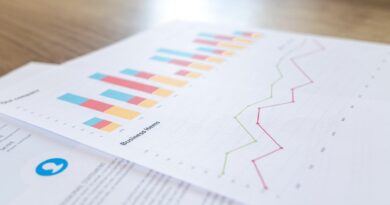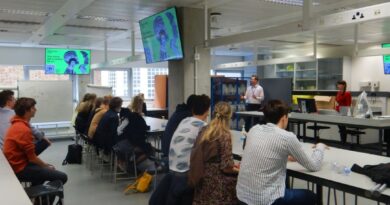Is there life … after your student time?
Some questions you might ask yourself, while you are enjoying your student life, are “What is next after my student life?”, “How is it like to work full-time?” and “Do I still have time for my friends and myself?”. From my personal experience I can assure you that even after a wonderful student time, working full-time as a graduated econometrician is not bad at all. Currently, I am working as a Management Consultant at Capgemini Invent, where I started almost two and a half years ago. I started with my internship where I wrote my thesis, and continued working as a consultant in the same team. Until this point in time I was a full-time student, probably just like most of you who are reading this right now. During my student life I was an active member at Asset | Econometrics, with the peak during the academic year 2015-2016, where I was part of the board as Internal Affairs. The goal for me in this article is to tell my story of how I decided to become a Management Consultant and what kind of professional life you could possibly have after your time as a student. I am also trying to answer the question what kind of skills I learned as a student that are still useful today.
Written by Björn Floor
Before I started at my current job, I had other opportunities to experience what it is like to work (part-time) and have responsibilities that come along with it, apart from the obvious fact of earning some extra money to finance my beers. I started at a small data science start-up, where I had a great time learning “how to bring econometrics into practice” and working in general. After one and a half years I started my Master’s and took a break from this part-time job to fully focus on my studies. However, after the first quarter of my Master’s I again had some time left. Through a friend I applied at a medium sized company (200 employees) as an internal data scientist. For me this was a nice experience to take a look behind the scenes of another company and gain extra working experience. After these jobs I decided that I only missed out on the professional experience of a ‘big’ company, so I decided to apply for an internship at Capgemini Invent. After this internship I made the decision to stay since I thought that a bigger company was a better fit for me.
Before I continue explaining what experiences of my studies and Asset | Econometrics still benefit me today, I want to briefly explain what a Management Consultant does in general. The goal and project of a typical Management Consultant is to help your clients improve their performance by improving their processes. These improvements are often achieved by identifying organizational problems, analyzing the root causes of these problems, proposing different kinds of solutions, and potentially helping them with the implementation of the solution. Let’s illustrate this by an example of a project I have worked on. The organization in question had a typical problem that I face in my day-to-day work.: “an organization could have the desire to improve their data quality”. In this case we first need to identify the motivation of the client as to ‘why’ they want to improve their data quality and in which instances it is especially important. This helps us better understand their problem and ‘scope’ the project, meaning that we can focus on the most important part first. Together with the scoping phase we can analyze their current situation, by charting their data flows. And then identify which data quality checks they have in place, which data quality checks are missing, and propose solutions on which checks to implement.
I want to emphasize that this is a very specific example of a project. As a Management Consultant you work on a wide variety of projects.. But in these kinds of projects my expertise as an econometrician can be very convenient. The reason for this is that during this project I worked with a lot of data, and as an econometrician you are trained to think carefully about the characteristics of data. Furthermore, the analytical method of solving problems taught at our studies is very important in typical projects. Besides the gained technical skills, the ‘soft skills’ I learned when being part of several committees at Asset | Econometrics are priceless as well. During projects it is important to set up frequent formal meetings with the project team, client, and experts within your own organization about this topic. As a starting consultant it is beneficial to have skills in agenda using, making & sending minutes, and chairing a meeting.
Another skill you develop during your time as a student when being part of an association, is ‘networking’. I know that this term sometimes has a negative connotation, since it might sound like ‘abusing’ your relationships for your own gain only. During your studies you probably all have used your network. For example, when you needed to do a difficult assignment, you probably collaborated with your fellow students or asked older students to help you out when you could not solve a difficult question together. Therefore, I see the skill of ‘networking’ more like building a good relationship with the people you like spending time with. And when you face some difficult challenges you do not have any experience with, you might ask this relation for help. This relationship comes from both directions, where you are also ready to help them out with your expertise.
Before wrapping up this article I want to illustrate the possible applications of econometrics using a project I personally did in the consultancy world. During my time as consultant, I developed a sustainability rater to predict the sustainability of a company together with another colleague. The idea of this project was to use text from companies’ websites to make predictions on how “sustainable” a company is. To realize this idea, we first had to gather our own data set, by identifying sustainable and non-sustainable companies. We extracted the data from the websites, processed this data, trained the NLP (Natural Language Processing) model, and eventually gave an individual score to each company in our test set using the programming language Python. In this project, the experience as an econometrician helped me understand and interpret the results of the NLP model and act accordingly.
Hopefully I have clarified the opportunities as a graduated econometrician by sharing my experiences. I hope you know better on how your skills as an econometrician could be applied, but also how your gained skills as an active member of an association could benefit you in your professional (future) career. Nevertheless, I understand that you still might have some questions. You can always contact me to have a cup of coffee in case you have any!




